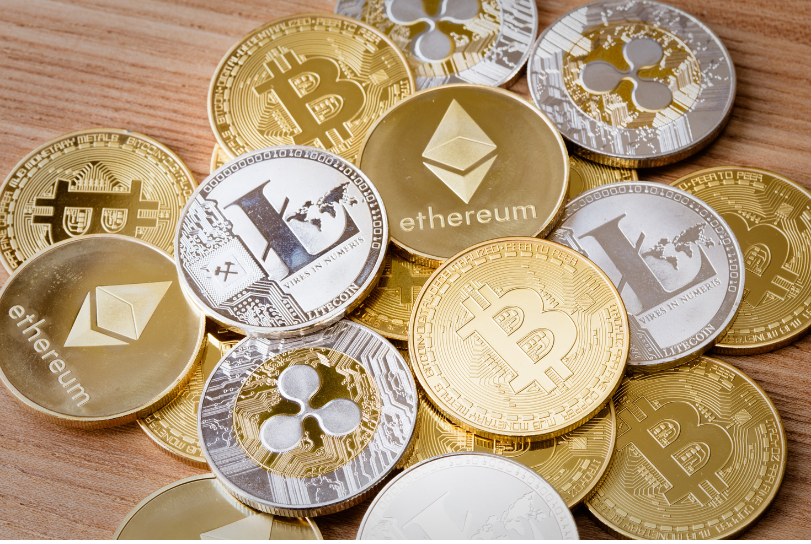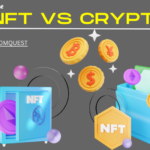Welcome to the world of cryptocurrency, where digital currencies and blockchain technology have transformed the way we transact and perceive money. Discover the exciting realm of decentralized finance, explore innovative use cases, and uncover the potential of this groundbreaking financial revolution. Let’s dive into the fascinating world of crypto!
Table of Contents
Introduction to Cryptocurrency

Cryptocurrency is like a digital treasure that relies on secret codes to stay safe. It’s a new way of handling money where no central bank is calling the shots. Instead, it’s all about decentralization and this fancy thing called blockchain. Think of blockchain as a giant digital book that records every transaction, making everything crystal clear and super secure.
What is Bitcoin?
Bitcoin is a digital type of money that doesn’t rely on banks or governments. This digital money was created in 2009 and used a special technology called “blockchain.” People can use Bitcoin to buy things or trade it as an investment. It has become really popular and valuable over time.
The Meaning of Cryptocurrency
Cryptocurrency is digital currency operating on a decentralized blockchain network. With advanced security measures like a fortress, cryptocurrencies ensure safe and fraud-resistant transactions.
They offer perks like lightning-fast transfers, worldwide access, and a chance for financial equality. But keep your eyes peeled, as they can be a double-edged sword with their unpredictable prices and uncertain regulations. It’s essential to dip your toes cautiously and stay informed before diving into the world of cryptocurrencies.
The Concept of Crypto Staking
Crypto staking is a process that involves holding and validating transactions on a proof-of-stake (PoS) blockchain network. Individuals can participate in network consensus and earn rewards by staking their cryptocurrency holdings.
Staking offers a passive income stream for crypto holders and contributes to the security and stability of the blockchain network.
Cryptocurrency and Its Impact on the Economy

The emergence of cryptocurrencies has a big impact on the world economy. It shakes up the old ways of handling money, encourages new ideas in finance, and ensures everyone can participate. Cryptocurrency can change how banking, sending money, and raising funds work, giving people worldwide a fair shot at financial services.
The Future of Cryptocurrency
As we look ahead, the future of cryptocurrency appears promising. The technology behind cryptocurrencies continues to evolve, addressing scalability and energy consumption concerns.
With increasing institutional adoption and regulatory clarity, cryptocurrencies are likely to become an integral part of our financial infrastructure, offering new opportunities and reshaping the global economy.
A Beginner’s Guide to Buying, Selling, and Transferring Crypto in 2023

Cryptocurrency has captured the attention of many investors and enthusiasts worldwide. If you’re new to the world of crypto and eager to explore buying, selling, and transferring cryptocurrencies, this guide is here to assist you.
In this section, we’ll walk you through the process step by step, providing a clear and concise understanding of navigating the exciting world of crypto transactions.
1. Choosing a Reliable Crypto Exchange:
Before diving into the crypto market, selecting a reputable crypto exchange platform is crucial. Look for platforms like Coinbase, Binance, or Kraken, known for their user-friendly interfaces and robust security measures. These exchanges offer a wide range of cryptocurrencies for buying, selling, and trading.
2. Creating an Account:
Sign up for an account on your chosen exchange to start your crypto journey. You’ll be required to provide necessary personal information and complete a verification process, ensuring compliance with regulations.
3. Setting Up a Wallet:
To store your cryptocurrencies securely, set up a digital wallet. Wallet options include software wallets (online or mobile apps), hardware wallets (physical devices), or even online wallets provided by the exchange itself. Choose a wallet type that suits your security preferences and accessibility needs.
4. Depositing Funds:
Once your account is set up, you’ll need to deposit funds into your crypto exchange account. You can link your bank account or use alternative payment methods like credit/debit cards or bank transfers, depending on the exchange. Ensure you follow the provided instructions carefully for a smooth deposit process.
5. Selecting the Right Cryptocurrency:
With thousands of cryptocurrencies available, it’s essential to research and choose the right one for your investment goals. Consider factors such as market trends, project fundamentals, and your risk tolerance. Popular cryptocurrencies like Bitcoin (BTC), Ethereum (ETH), and Litecoin (LTC) are often good starting points for beginners.
6. Placing an Order:
Once you’ve decided on a cryptocurrency to buy, placing an order on the exchange platform is time. You can choose between a market order, which buys at the current market price, or a limit order, where you set a specific price at which you want to buy. It’s advisable to start with smaller investments until you gain more experience.
7. Monitoring and Selling:
Stay vigilant and keep an eye on the market performance of your chosen cryptocurrency. If you decide to sell, you can place a sell order on the exchange platform, specifying the desired selling price and quantity. Setting realistic expectations and considering market conditions when making selling decisions is important.
8. Transferring Cryptocurrency:
To transfer your cryptocurrencies to another wallet or exchange, generate a unique wallet address for the recipient. Using your wallet or exchange account, initiate the transfer process by entering the recipient’s wallet address. Double-check the address to ensure accuracy, as cryptocurrency transactions are irreversible.
In short, as you embark on your crypto journey in 2023, remember that buying, selling, and transferring cryptocurrencies requires caution and informed decision-making. Be mindful of security measures, stay updated on market trends, and seek knowledge from reliable sources.
With patience and the right approach, you can navigate the world of cryptocurrencies and potentially benefit from this exciting digital asset class. Happy investing and exploring the realm of crypto transactions!
Exploring Different Types of Crypto Wallets: Uses, Overview, and Benefits

As cryptocurrencies gain popularity, it becomes essential to understand the various types of wallets available to store and manage your digital assets.
In this section, we’ll explore different crypto wallet options, their uses, provide an overview, and highlight their benefits. By the end, you’ll have a clearer understanding to help you choose the best wallet for your needs.
1. Hardware Wallets:
Hardware wallets are physical devices designed to store cryptocurrencies offline securely. They provide an extra layer of security by keeping your private keys offline, away from potential online threats.
Popular hardware wallets include Ledger Nano S, Trezor, and KeepKey. Their compact size and encryption make them reliable for long-term storage and protection against cyber-attacks.
2. Software Wallets:
Software wallets come in different forms, including desktop, mobile, and web-based applications. These wallets store your private keys on your device or through a trusted third party. Examples of software wallets include Exodus, Trust Wallet, and MyEtherWallet.
They offer convenience and accessibility for everyday transactions, making them ideal for frequent use.
3. Online Wallets:
Online wallets, also known as web wallets, are cloud-based wallets that store your private keys on a remote server managed by a third-party service provider. Examples include wallets offered by cryptocurrency exchanges like Coinbase and Binance.
Online wallets offer easy accessibility from any device with an internet connection, but they are more susceptible to hacking and security breaches. It’s recommended to use them for small amounts or temporary storage.
4. Paper Wallets:
Paper wallets involve generating and printing your private keys on a physical piece of paper. They provide an offline storage option and are immune to online threats. Paper wallets can be created using dedicated websites or software tools. However, they require careful handling and safekeeping to prevent loss or damage.
5. Mobile Wallets:
Mobile wallets are smartphone applications that allow you to store, send, and receive cryptocurrencies on the go. They provide a convenient option for everyday transactions, making them popular among users who prefer to manage their crypto holdings using their mobile devices. Some well-known mobile wallet options are Coinbase Wallet, Trust Wallet, and Mycelium.
Choosing the Best Wallet:

The best crypto wallet depends on your specific needs and preferences. Consider the following factors when making your decision:
– Security: Hardware wallets offer the highest level of security, while online wallets provide convenience but have higher security risks.
– Use Case: Determine whether you need a wallet for frequent transactions or long-term storage.
– Cryptocurrency Support: Ensure that the wallet supports the cryptocurrencies you intend to store or trade.
– User-Friendliness: Choose a wallet with an intuitive user interface that matches your level of technical expertise.
In short, the cryptocurrency market offers a variety of wallet options to suit different needs. Hardware wallets provide enhanced security; software wallets offer convenience; online wallets grant accessibility; paper wallets ensure offline storage; and mobile wallets allow on-the-go management.
Consider the features, security measures, and your specific requirements when selecting a crypto wallet. Remember, maintaining the security of your private keys is paramount. Choose wisely, and embark on your crypto journey with confidence!
Conclusion

Cryptocurrency has opened the door to a whole new world of digital transactions, turning how we deal with money upside down. Led by Bitcoin, cryptocurrencies have taken the world by storm and are shaking up how we’ve always done finance.
However, it is crucial to navigate this evolving landscape cautiously, understanding cryptocurrency’s benefits, risks, and implications. The future holds great potential for cryptocurrencies, and embracing this transformative technology may open doors to a new era of financial freedom.
FAQs
FAQ 1: Can I use cryptocurrencies for online shopping?
Yes, many online merchants and platforms accept cryptocurrencies as a form of payment. Major companies like Microsoft, Overstock, and Shopify have integrated cryptocurrency payment options.
Additionally, specialized platforms like BitPay and CoinGate facilitate crypto payments for various online businesses. It is important to check if the merchant you wish to transact with accepts cryptocurrencies.
FAQ 2: How do crypto banks operate?
Crypto banks function similarly to traditional banks but with a focus on cryptocurrencies. They provide services such as crypto savings accounts, loans, debit cards, and payment solutions.
Crypto banks leverage blockchain technology to ensure transaction security, transparency, and efficiency. They enable individuals to manage their cryptocurrency assets and access various financial services within the crypto ecosystem.














Leave a comment